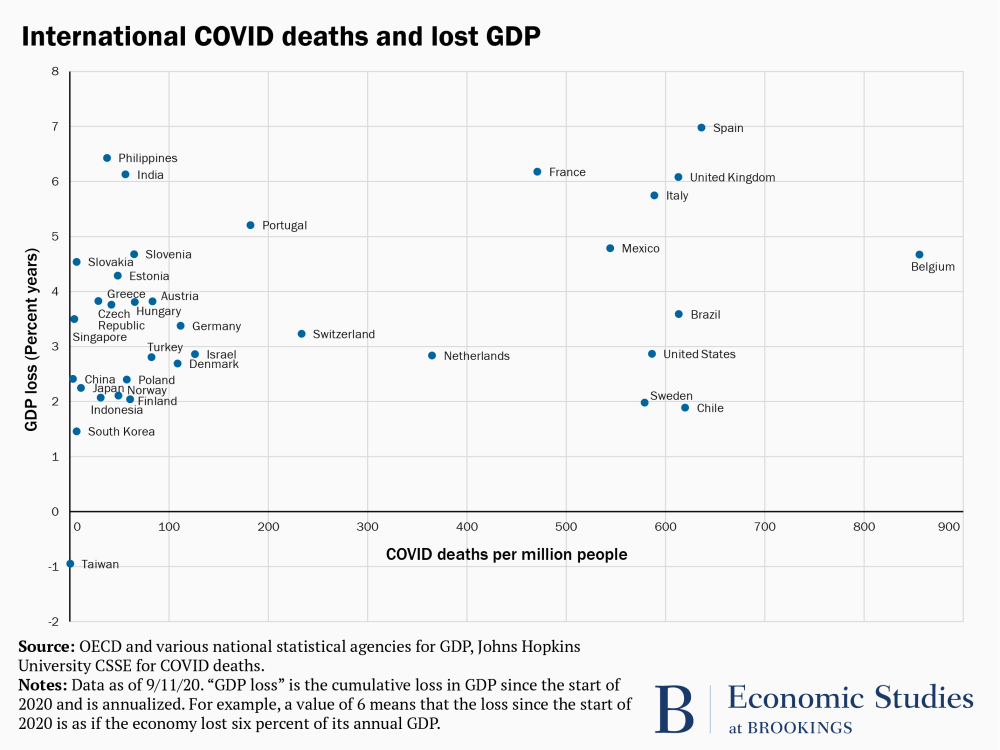Macroeconomic results and COVID-19: A progress report
3 min readSome nations, cities, and U.S. states have so considerably managed to weather the COVID-19 pandemic with rather couple fatalities and constrained economic losses while others have endured large death prices and massive financial losses, in accordance to a paper to be mentioned at the Brookings Papers on Financial Activity (BPEA) meeting on September 24. A couple of localities don’t drop neatly into either group.
Figuring out the roles of luck and coverage in these health and fitness and economic results will be critical to preventing upcoming pandemics, propose the authors— Jesús Fernández-Villaverde of the University of Pennsylvania and Charles I. Jones of Stanford University.
In Macroeconomic results and COVID-19: A development report, the authors sorted localities into groups centered on deaths for each million people (by means of late August) and economic losses (approximated from gross domestic item stories, unemployment fees, and Google maps mobility information).
Most locations both had each large death costs and big economic losses (New York Town, the Lombardy area of Italy, the United Kingdom, Madrid) or small death prices and reduced economic losses (Germany, Norway, Japan, South Korea). That indicates that managing the virus has been important to limiting financial losses, the authors produce.
“Good outcomes actually are probable. It wasn’t the circumstance that we all obtained hit with this point and we all experienced terrible results,” Jones explained in an job interview with Brookings.
But the authors notice a several localities, this sort of as California, had a reduced loss of life fee but reasonably significant financial losses. And other individuals, these as Sweden, endured a significant loss of life price but only confined economic losses.

They publish that, presented current knowledge, it is “incredibly challenging” to decide no matter whether significant death tolls were the item of poor luck or terrible policy. For occasion, South Korea and Germany equally carried out early and aggressive testing plans and intense use of contract tracing. But some proof tentatively implies that previous knowledge with the SARS and MERS viruses helped nations in Asia be better geared up and that COVID victims in Germany were young, on typical, than in the relaxation of Europe.
The outliers from the general pattern—California and Sweden—offer attention-grabbing comparisons. California and New York suffered related financial losses (both observed their unemployment rates shoot to about 15 p.c in April) but New York has experienced 1,700 fatalities per million citizens and California just 300. Could California have contained the virus with much less reduction in financial exercise? Sweden experienced demise fees comparable to all those in Italy, the United Kingdom, and Spain but experienced substantially lesser economic losses. On the other hand, neighboring nations these kinds of as Norway, Finland, and Denmark also suffered only restricted economic losses even nevertheless they imposed additional stringent restrictions than Sweden. They seasoned decrease dying prices: 49 for every million in Norway, 60 in Finland, and 107 in Denmark vs . 575 in Sweden. Could Sweden also have obtained a reduce loss of life fee though still limiting economic losses?
The pandemic is nevertheless ongoing, and in six months the relative roles of luck and plan should really become clearer, giving lessons for the potential, the authors say.
“This might perfectly be the initially of other pandemics in the really globalized planet we have now,” Fernández-Villaverde said. “If it occurs again, we want to be a lot improved well prepared.”
David Skidmore authored the summary language for this paper. Becca Portman assisted with data visualization.
Quotation
Fernández-Villaverde, Jesús and Charles I. Jones. 2020. “Macroeconomic Outcomes and COVID-19: A Progress Report.” BPEA Meeting Draft, Slide.
CONFLICT OF Desire DISCLOSURE
The authors did not get economic help from any company or individual for this posting or from any agency or individual with a financial or political desire in this paper. They are at this time not officers, administrators, or board members of any organization with an fascination in this paper.




